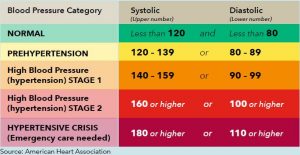Find care now
If you are experiencing a medical emergency, please call 911 or seek care at an emergency room.

Sometimes the deadliest diseases can be the hardest to detect.
Such is the case with hypertension, or high blood pressure. According to the Centers for Disease Control and Prevention (CDC), about one-third of all adults in the U.S. have high blood pressure—a common condition that increases the risk for heart disease and stroke, two of the leading causes of death for Americans.
can cause, it is important to check blood pressure regularly and know your levels. Most local pharmacies have blood pressure cuffs and can check it for you.
The American Heart Association defines five categories of hypertension. If your blood pressure reaches stage 1 or stage 2, you should make an appointment with your doctor to discuss treatment options. If you have a sustained blood pressure of 180/110 or higher, call your doctor right away. He or she may intervene immediately or arrange for emergency evaluation.
At-Risk Populations

Just about anyone, at any age, can develop hypertension. However, African-Americans and women over 65 years of age are at higher risk for the disease than other groups. Other risk factors for developing high blood pressure include family history, older age, lack of physical activity, a diet high in sodium and low nutritional value, being overweight, stress, excessive alcohol consumption and smoking.
Treatment and Prevention
According to the CDC, only half of the people who have the disease manage it properly. Yet it is possible to prevent and treat it. A physician can prescribe medications to help lower or maintain blood pressure.
In addition, a healthy lifestyle that includes eating a balanced diet, staying physically active and not smoking can help control blood pressure. Managing other existing health conditions may help, too.
Checking your blood pressure regularly, especially if you are at a higher risk, is important to the health of your heart and arteries, and your other vital organs as well. Don’t let a silent disease become a silent killer.
Learn More
For more information about emergency, urgent and trauma care, visit MedStarGeorgetown.org/ED or call 202-342-2400.














